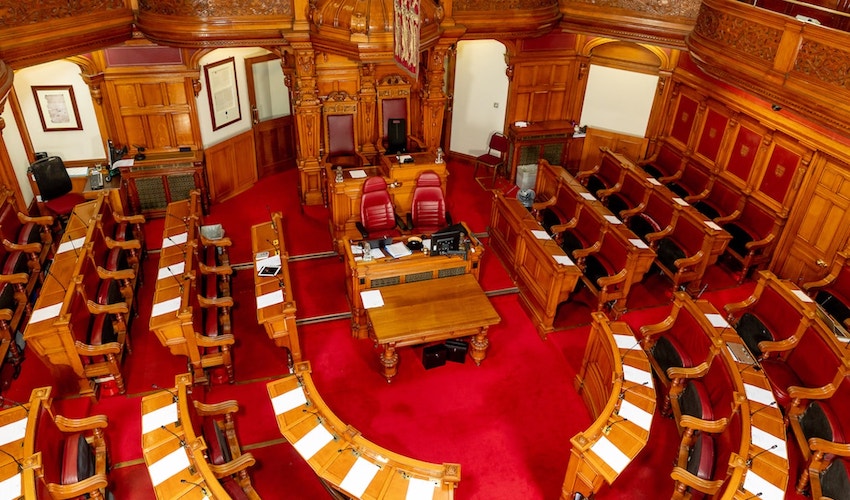


From population size to house prices, unemployment, the health of our economy and whether the cost of your shopping is rising or falling…
Statistics Jersey is responsible for painting an accurate picture of life in Jersey by numbers - reliable, impartial data we can use to make judgments on our quality of life and assess how well policymakers are doing their jobs.
But Express can reveal today a two-year struggle to keep Statistics Jersey independent from undue Government influence, resulting in the exit of a highly respected statistician after 20 years' service to the island…
Oxford D.Phil Particle Physics graduate Dr Duncan Gibaut joined the Government of Jersey as a statistician in 2001, after stints as a research physicist at a Pennsylvania university, an Assistant Professor at Virginia Tech and a Physics Teacher at De La Salle.
He rose to the post of Chief Statistician in 2007, leading a team of the some of the island’s most gifted maths and science boffins in a unit which became known as ‘Statistics Jersey’ when its role became officially enshrined in law in 2018.

Pictured: Statistics Jersey is responsible for putting out impartial reports on many different aspects of island life.
The unit has always prided itself on the fact that its reports are not processed by the Government’s PR machine in advance of publication - despite, according to inside sources, attempts by successive Government communications officials to persuade them otherwise over the years.
It operates on the principles of openness, transparency and, since 2018, ‘equal access’ to statistics, meaning that members of the public, journalists, Ministers and civil servants all receive reports produced without favour or partiality to digest at the same time.
To maintain this separation, the body has always operated at ‘arms length’ from Government, with the Chief Statistician technically not accountable to any ‘boss’. This set-up was informal, however, until the 2018 law put Statistics Jersey’s independent status into writing.
It opened a legal gateway for Government data to be shared publicly in line with data protection principles and, crucially, gave the Chief Statistician - and anyone they delegated responsibility to - official permission to comment “on the quality and interpretation of any statistics produced by public authorities.” In other words, they would have the ability to cut across spin.
The law also said that the Government “must ensure that Statistics Jersey is resourced and has the ability to carry out its functions under this Law free from political influence.”
“This new legislation secures for the future a high quality and independent Statistics Jersey. We exist to provide a relevant, accurate and objective data service for all islanders and businesses and to help the States of Jersey make informed, evidence-based decisions,” Dr Gibaut said at the time.
But, among the affectionately-named ‘stattos’, and the independent regulatory body that sets their work schedule known as the Statistics Users Group (SUG), there were concerns there may be a chink in the armour guarding the unit’s independence.

Pictured: Statistics Jersey operates on the principle of equal access to data - meaning Government departments don't get advance access to their findings ahead of the wider public.
The Chief Statistician was still, technically, operating under Government rule, with his team's budget and resources controlled by the Director General of Strategic Policy, Planning and Performance (SPPP) - a new department created as part of Chief Executive Charlie Parker’s ‘OneGov’ restructuring.
It's believed Dr Gibaut envisioned Statistics Jersey as a grant-funded body in charge of its own affairs, mirroring the Children’s Commissioner or the Gambling Commission.
It was also hoped that independence might provide a new HQ for the team - away from Broad Street where the group had been asked to set up, much to their dissatisfaction, when the Government moved from Cyril Le Marquand House.
From a practical perspective, a new base would mean that no Government eyes would be able to scan the sensitive data or reports they were producing; from a symbolic one, it would underline their independence.
Insiders told Express that, back in 2018, newly-elected Chief Minister Senator John Le Fondré was enthusiastic about the unit’s bid to fly solo and use its powers to produce reports of greater depth and quality to feed into policymaking in crucial areas such as population, among others.
But this zest appeared to fade as Mr Parker’s OneGov reforms were ushered in. In fact, sources told Express the pair almost seemed to want to reverse the progress made altogether and “weaponised” a loophole under the States of Jersey Employees Law.
Pictured: The Statistics Jersey team wanted to be based outside of the Government's Broad Street HQ to protect their ability to work independently.
While Statistics Jersey was supposed to be able to operate independently, the team were still employed as civil servants, preventing them from being able to make any comments on Government data, even to States Members - something they were supposed to be able to do without fear of repercussion under the 2018 law.
Those concerns were raised with the Chief Minister and Chief Executive with a view to rectifying them - but, far from acting on these worries and moving swiftly to update the law, what instead returned were a set of suggestions to update laws in a way that was perceived as harming the unit’s independence.
Concerns gave way to frustrations, with the row documented in uncharacteristically blunt minutes from a SUG meeting in September 2020.
SUG concluded that “the current Law Drafting Instructions (LDIs) did not represent a step forwards, and if anything were a slight step backwards”, adding: “The draft LDIs did not progress the independence of Statistics Jersey (SJ) as directed by the Chief Minister (CM) in November 2018.
“The Chief Statistician (CS) was too constrained, and should be able to explain SJ statistics and methodology to States Members and other public bodies. SUG itself was slightly constrained.
“The LDIs did not have the appropriate consideration of UN principles and other international documents of best practice. The amendments have evolved over the last 18 months into something completely different from originally envisaged.”

Pictured: A loophole in the law means statisticians aren't able to provide comment or insight on their findings - even to the States Members that needed the facts and figures to make informed voting decisions - because they are employed as civil servants.
They added that SUG had outstanding questions on its own independence and that of the Chief Statistician, as well as Statistics Jersey’s funding, resourcing and liability, and had written to the Chief Minister on the matter. Concerns on the latter particularly came to a head in May 2020 when Dr Gibaut was called upon to do some covid modelling for Government "because no one else could". SUG observed at the time that there was a "a risk to Statistics Jersey" if "these modelling come out as a government product, but visibly associated with Statistics Jersey."
As the independence row escalated, Dr Gibaut was abruptly put on gardening leave in November 2020, sources said.
The news sent shockwaves through Statistics Jersey - not least because the departure of the island’s most experienced statto had been ordered just months before the team was about to embark on its most important project of the decade: the 2021 census.
One source described the team as being in "panic mode” in the immediate aftermath, with no inkling of who would take the leading role of Chief Statistician as they entered the final stages of census preparation.
In the end, it emerged that no one would be stepping into that exact position. Under the Government’s restructuring, the role was to be replaced by a new title of ‘Director of Analytics and Statistics’.
Not only would the post absorb the Chief Statistician’s functions, but would also oversee a new Government team of ‘analytics’ experts in the SPPP department, whose work would primarily focus on Public Health in the wake of covid.

Pictured: SUG have shared their concerns with the Chief Minister, Senator John Le Fondré.
The new job description and portfolio has generated worry among Statistics Jersey and SUG.
Among their key questions are, will the new Director be accountable to a Director General as a result of the SPPP link or will they be allowed to remain independent?
If a Director General does formally become the ‘boss’ of the individual performing the functions of Chief Statistician, will that provide the Government a back door to exerting their PR influence over reports?
Amid these independence fears, recent weeks have brought a sense of optimism.
Ian Cope started as Interim Director of Analytics and Statistics this month, and will be guiding the unit through the impending 2021 census process.

Pictured: An Interim Director of Analytics and Statistics has been recruited to fulfil Dr Gibaut's role.
As an experienced statistician with 21 years at the UK’s Office of National Statistics, during which time he led preparations for the UK’s own 2021 Census, it is hoped that Mr Cope will be both able and willing to help make the argument for its full operational independence.
For now, legal loopholes remain, and the drafting process to correct them remains up in the air. With pressures on Government resources caused by the pandemic, there are concerns the can will be kicked down the road amid claims the issue is too time-consuming and/or purely technical and therefore “not a priority.”
But, as sources warned, the need to solve it cuts to the heart of democracy - it's not just about numbers, but ensuring that the data being used to justify political moves to shape our lives are robust and trustworthy.
Comments
Comments on this story express the views of the commentator only, not Bailiwick Publishing. We are unable to guarantee the accuracy of any of those comments.